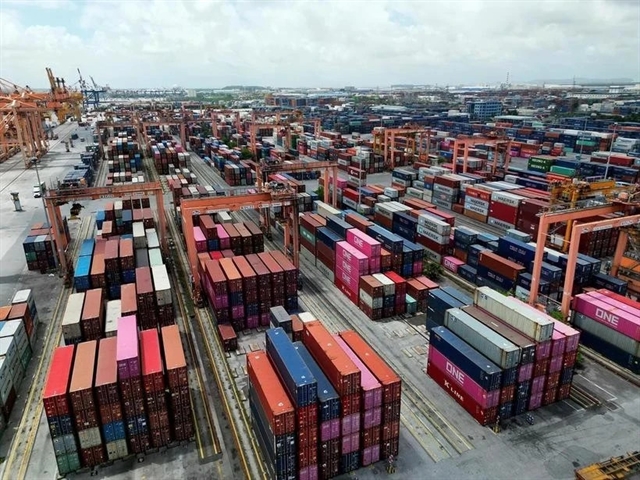 Economy
Economy

 |
| A container warehouse at Tân Vũ Port in Hải Phòng City. — VNA/VNS Photo |
HÀ NỘI — The logistics industry’s business community has expressed optimism about growth prospects in 2025, with nearly 42 per cent of companies surveyed by Vietnam Report JSC affirming that their business outlook will be more positive.
This optimism is not only rooted in improvements within the companies themselves but also in the assured support from Government policies and the global growth trend in international trade, according to the survey.
Not only businesses but many economists also expect that 2025 – the final year of the 2021-25 five-year socio-economic development plan – will see a strong transformation in Việt Nam’s logistics industry. Companies are set to take advantage of opportunities arising from the global supply chain shift, ramp up investments and apply advanced technologies to strengthen the sector’s vital role in the economy, it said.
Vũ Đăng Vinh, CEO of Vietnam Report, said with the support of the Government, logistics companies have been provided with numerous advantages, resolving several internal challenges and stabilising operations.
The Government has focused on administrative reforms, particularly in customs and specialised inspection agencies, reducing procedure times and legal costs for businesses. Strategic ports like Lạch Huyện in Hải Phòng and Cái Mép-Thị Vải in Bà Rịa-Vũng Tàu continue to be upgraded, driving maritime transport, a key segment of logistics.
Furthermore, the application of technologies such as artificial intelligence (AI), blockchain and supply chain management (SCM) systems has been strongly encouraged, improving productivity and management efficiency in many logistics businesses.
According to Vinh, this period is crucial for the successful implementation of the action plan to enhance Việt Nam’s logistics competitiveness and develop logistics services by 2025. It also marks an important preparatory phase for the logistics services development strategy for 2025-35, with a vision to 2050, aiming to establish logistics as a spearhead service sector, thereby enhancing national competitiveness, he added.
The Government is also accelerating key transport infrastructure projects, focusing on connecting and developing integrated logistics infrastructure to improve domestic and international transport efficiency, while policies to promote trade, attract international investment, and leverage the benefits of new-generation Free Trade Agreements (FTAs) are being implemented.
These efforts not only stimulate the development of high-tech logistics centres but also create modern supply chains, enhancing the value of domestic and international logistics services. Looking forward, the collaboration between the Government, businesses and associations will not only help the logistics sector overcome current challenges but also position Việt Nam as a leading logistics hub in the region.
From a business perspective, Nguyễn Thị Hoa, director of Goldtrans Transport and Forwarding JSC, a company that enjoyed a successful year in 2024, said that Goldtrans is highly optimistic about both its own growth prospects and the overall development of the logistics industry, as market demand begins to recover.
In particular, with increasing signs that the US-China trade conflict may intensify, foreign direct investment inflows into Việt Nam are expected to rise, Hoa held, revealing that Goldtrans has set a growth target of 20 per cent for 2025.
Recommending solutions and strategies to help logistics companies optimise operational costs, enhance productivity, develop human resources and diversify markets, Đào Trọng Khoa, chairman of the Việt Nam Logistics Business Association (VLA), stated that in the short term, businesses must continue to accelerate digital transformation and adopt technologies while practising environmental, social and governance (ESG) standards to pursue sustainable growth or green logistics. — VNS




